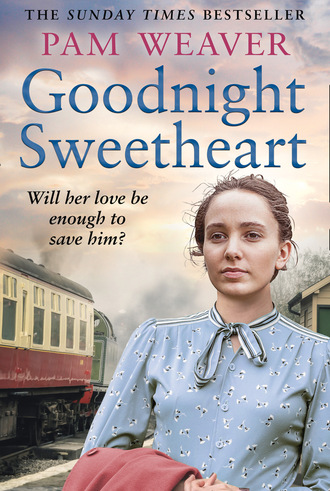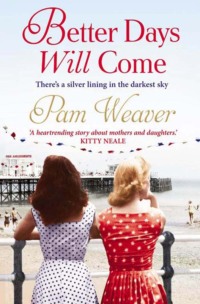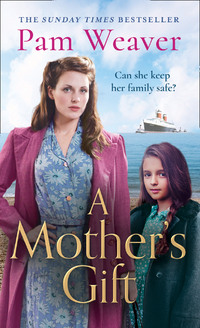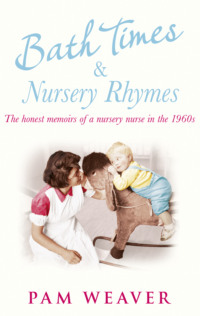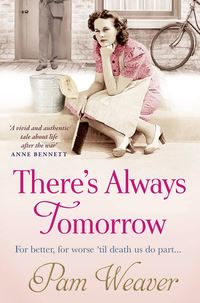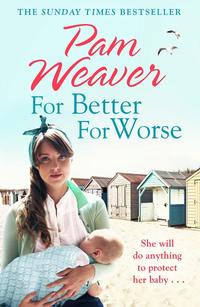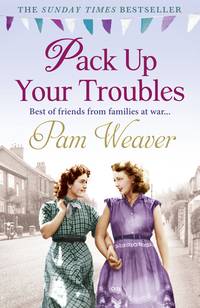‘Looks to me like you’re quite keen on that Barbara Vickers,’ she said, willing herself to sound casual.
Her son pulled a face. ‘She’s all right, I suppose.’
‘That’s a matter of opinion,’ Bet said coldly.
He turned his head to look at her. ‘What’s that supposed to mean?’ His voice had an edge to it.
‘When you get to my age,’ said Bet, ‘you learn how to take stock of people and that girl is trouble with a capital “T”. She’s the type who can trap a boy into marriage and …’
Alan snorted. ‘You needn’t worry on that score, mum. I’ve no intention of marrying Barbara Vickers.’
‘Well, see to it that you give her no reason to expect it,’ said Bet, sweeping out of the room.
Ten
Worthing, June 1939
There was nothing on at the pictures so Barbara suggested that she and Frankie go to the matinee variety show at the pier pavilion. Over the past year, the two girls had fallen into a sort of routine. They often met on a Wednesday night to go to the pictures and on a Saturday they went to a show in the afternoon or to a dance in the evening. Today they had managed to get good seats and the show was enjoyable. Frankie particularly liked the glittering costumes of the dancing girls. The comedian Cyril Fletcher recited some very funny poems and Dorothy Ward led everybody in the theatre in some community singing. The lead singer of the show was an up-and-coming name (or so the compère told the audience) – Conrad Merriman. Good-looking with deep-set eyes and black hair, Conrad was everybody’s idea of tall dark and handsome and when he smiled he had a long dimple on his cheek. Frankie didn’t like him that much but Barbara thought he was wonderful. After the show Barbara insisted they go to the stage door and she was amply rewarded when Conrad Merriman emerged.
‘Can I have your autograph?’ said Barbara, rushing towards him.
‘Of course, darling,’ he simpered and, giving her a kiss on her cheek, he signed her programme then looked up, expecting Frankie to want the same treatment. Embarrassed, Frankie handed him her programme and he signed it.
‘A few of us are going onto the pier for some ice cream,’ he said. ‘Would you care to join us?’
Barbara was overjoyed so they joined in. There were several in the group including some of the dancing girls and another comedian called Stainless Steven. They all went to the kiosk and bought their cones, then everyone strolled along the wooden planks towards the other pavilion at the end of the pier. Conrad slipped his arm around Barbara’s waist and pulled her close.
‘Put her down, darling,’ someone said. ‘You don’t know where she’s been.’
‘She’s too young to have been anywhere,’ said another voice and everyone laughed.
Barbara wasn’t too happy with that remark, but she was delighted when Conrad kissed her cheek again and said, ‘I think she’s absolutely gorgeous, aren’t you, darling?’
Frankie struck up a conversation with one of the dancing girls, Lily, who said she was from York. ‘I love it here,’ she said. ‘I’ve got a booking for the whole season.’
‘You looked beautiful on the stage,’ Frankie said. ‘I loved the top hat routine.’
Lily did a few steps just for her and they both laughed. Halfway along the pier, there was a photo booth. You could stand in behind a wooden frame with Tarzan, Jane and a monkey picture on it. The faces had been cut out so day trippers were invited to stick their heads through the holes and pose for a picture. Conrad stood behind the Tarzan cut out and invited Barbara to join him as Jane. Frankie was encouraged to bend down low and put her head through the monkey hole. While the photographer snapped away, Frankie was startled to feel Conrad’s hand wandering over her bottom. She stood up smartly.
‘Just one more,’ said the photographer but Frankie was already walking away.
*
A day or two later, they were sitting at the dinner table when Alan told his parents about meeting Mr Jarvis, Durrant’s promoter. ‘He’s going to take me on next year for the Isle of Man TT.’
Uncle Lorry was bursting with excitement. ‘Dear Lord alive, you’ll be up there with all the best riders. What an experience, lad.’
‘No,’ said Aunt Bet. ‘Alan, you can’t go. It’s too dangerous.’
‘Now then, Bet love,’ Uncle Lorry began.
‘Don’t you “Now then, Bet love” me!’ she snapped and she banged a plate down in front of him. ‘You know Percy Pritlove was killed there last year.’
‘You can’t stop me, Mum,’ said Alan shaking the HP sauce onto his dinner. ‘I’m old enough to make my own decisions.’
‘This is a chance of a lifetime, Bet,’ Lorry protested mildly. ‘You can’t say no just because you’re afraid he might get hurt.’
Frankie could tell her aunt was upset but she didn’t say anything. As soon as the men went back outside and Aunt Bet stood up to put the plates in the sink, Frankie came and put her arm around her shoulders. ‘He’s a really good rider,’ she said. ‘He thinks things through and he doesn’t take stupid risks. That’s why he’s been chosen.’
Aunt Bet nodded. ‘I suppose you’re right,’ she said. ‘And your uncle’s right as well. I’m just being silly. I know he’s a grown man but he’s still my boy.’
The two women shared a hug. ‘And just look at you,’ said Aunt Bet suddenly holding her at arm’s length. ‘Soon to be sixteen and quite the young lady already.’ Frankie gave her a half smile. ‘What?’ said Aunt Bet. ‘What is it?’
‘Now you’ll think I’m being silly,’ said Frankie, sitting back down at the table.
‘Let me be the judge of that,’ said her aunt.
All the time she’d lived with them, they’d never really talked about her mother. The grief they’d both felt, they’d kept it private. It wasn’t a deliberate decision, it just happened to be that way. Frankie knew any one of them would have listened if she’d needed to talk but she’d slipped into the habit of managing on her own.
Frankie took a deep breath. ‘Before she left the shop, Doreen told me her mother had taken something from my house. Something belonging to my mother – tarot cards.’
Aunt Bet seemed surprised. ‘I can’t imagine your mother having tarot cards,’ she said. ‘I was the one who worried about the future and superstitions. I got it from your gran, I suppose. Your mother was different. She was very much a no-nonsense sort of person.’
Frankie frowned. ‘What are tarot cards anyway?’
‘They’re supposed to be a guide for living,’ said Aunt Bet. ‘People use them to find out what’s going to happen in the future.’
After hearing that, Frankie had to agree that her aunt was probably right. Her mother had had no time for what she called mumbo-jumbo, such as predicting the future.
‘Anyway, why would Doreen’s mother take something that didn’t belong to her?’ said Aunt Bet. ‘I thought she was religious.’
‘She is,’ said Frankie.
‘Then what was she doing stealing Moira’s things?’
‘Doreen seemed to think she was trying to save me.’
Aunt Bet frowned and shook her head slowly.
‘I often think about the things my mother had,’ Frankie said wistfully. ‘I remember some playing cards and a white cat that used to be on the mantelpiece.’ She smiled. ‘She always told me not to touch it but when she wasn’t looking, I used to stroke it.’
Aunt Bet laid her hand gently over the top of Frankie’s. ‘Stay there, ducks,’ she said. ‘I want to show you something.’
Her aunt hurried upstairs and came back down a few minutes later with a little suitcase. As she seldom dusted up high, the case was covered with a thick layer of grime. She found a damp cloth and a moment or two later, she put the case in front of Frankie.
‘I wasn’t sure when to give you this,’ she said. ‘I was going to wait until you left home or when you got married but I think now is the right time.’
Frankie looked up. ‘I’ve never seen this before.’
‘The case is mine,’ said Aunt Bet. ‘But the things inside belonged to your mother and now they belong to you. You may want to keep some, you may want to get rid of some, it’s up to you.’ She smiled. ‘I’m going to leave you now,’ she went on. ‘The men won’t be back until tea time and judging by the things in that case, you’ll be a little while. Take your time. I’ve got plenty to do upstairs.’
Taking her box of dusters and cleaning things, she left the room and the door clicked shut. Frankie stared at the lid of the case for some time before she found the courage to open it. The first thing she noticed was the smell. She couldn’t define it, but somehow or other it was exclusive to her old home. Five years of being shut up on the top of the wardrobe hadn’t taken it away. A mixture of Lily of the Valley (her mother’s favourite soap) and blackberries; the smell of silks and other materials she used for her dressmaking. It was all there. Perhaps it was only her imagination but it made Frankie’s heart flutter and brought a lump to her throat. She stared at the contents.
A few official papers rested on the top. Frankie turned them over but didn’t examine them closely. They included her mother’s marriage certificate and Frankie’s birth certificate. She spotted a little pink card which said ‘congratulations on the birth of your daughter’. Next she found a black-edged card announcing her father’s death and a misshapen lump of baked clay – a pot Frankie had made at school. Her mother had kept it on the mantelpiece and used it to store her long tapers for lighting the fire. Frankie smiled, recalling her mother’s reaction when she’d presented it to her. ‘Oh, Frankie, it’s beautiful! How clever you are.’ Well, it wasn’t beautiful and she wasn’t one bit clever. It was hideous, but the love in her mother’s voice had told her something very different on the day she’d brought it home. Frankie’s eyes smarted.
Next she found a bundle of letters tied with blue ribbon. It would take a while to read them but a glance at the back of the one of the envelopes told her they had been written by her father. It was stamped ‘Somerley House, Ellingham, Ringwood, Hants,’ the convalescent home where her father had started his road to recovery. She remembered her mother once telling her that they had transferred him from there to Cecil’s Red Cross Hospital, Chappell Croft in West Worthing just before they’d married.
Laying the letters down, she picked up the white cat, only now that she looked at it more closely she could see it wasn’t a cat at all. It was an exquisitely carved ivory lioness. Where on earth had her mother got that from?
Frankie found a few more things which were meaningless to her but obviously had been treasures to her mother: a broken watch, a few bits of jewellery, two grainy photographs, one of her mother with a young man and another of her mother standing on her own in front of a large house.
Frankie heard a footfall behind her and looked up to see her aunt standing beside her.
‘All right, my dear?’ she asked anxiously. She held out a folded handkerchief and shook it open. Frankie hadn’t even been aware that she was crying. She wiped her wet cheeks and blew her nose, then holding up the photograph she said, ‘Who is that man standing next to my mother?’
‘Why, that’s your father,’ said Aunt Bet sitting down beside her, ‘before he went to war.’
Frankie looked more closely. He was a handsome man, no more than twenty, with thick wavy hair. He stood close to her mother but not actually touching. ‘I never saw a picture of him before,’ she said quietly. ‘What was he like?’
Aunt Bet smiled. ‘I liked him a lot. Before the war he was funny and a bit of a practical joker. He enjoyed singing too.’
‘Go on,’ said Frankie sensing there was more to come.
Her aunt took the photograph in her hands. ‘They used to ride on a tandem. Went all over the place.’ She chuckled. ‘I remember him telling us that one day they went to see his auntie and uncle. His uncle was famous for his home-made wine and your mother and father had a couple of glasses. When they left, your dad reckoned they did five miles in about fifteen minutes before they both fell off the bike and into a hedge.’
Frankie smiled, imagining the scene. ‘Why didn’t Mum have any photographs of him after he came back from the war?’
Aunt Bet seemed embarrassed and made to leave the table.
‘No, tell me,’ Frankie insisted.
Aunt Bet laid her hand on Frankie’s arm. ‘He was so terribly injured,’ she said quietly. ‘His poor face was …’ She faltered, her eyes brimming with tears. ‘But your mother never stopped loving him. She didn’t seem to notice how dreadful he looked but she didn’t want any photographs. She wanted us to remember him as he was.’
‘She never told me,’ said Frankie. ‘What happened to his face anyway?’
Aunt Bet seemed reluctant to say any more but eventually she put her hand to the side of her face in a sweeping gesture. ‘All of this side of his face was shot away,’ she said simply. ‘The shell fragment didn’t hit any vital organs or an artery but your poor father was left with only half a face.’
Frankie was stunned. ‘But Mum said he was gassed,’ she protested.
‘Well, she wouldn’t want you to know about his face, would she?’ said Aunt Bet. ‘You were only a child. She didn’t want you to be upset.’
Frankie turned back to the case. There wasn’t a lot left inside but she began to empty everything out and put it onto the table.
‘They bought that silly ornament when they were on their honeymoon,’ said Aunt Bet holding up a china boot with ‘A present from Weymouth’ on it.
Frankie lifted an upside-down book from the very bottom of the case. When she turned it over, she took in her breath sharply. Aunt Bet had got up from the table and was making a fresh pot of tea. Frankie quickly leafed through the pages. It was a children’s book, beautifully illustrated on every page. She didn’t need to read the story. She knew it off by heart. A Russian princess comes into a dress shop. A fearsome-looking man with a knife follows her in and it’s obvious that he has evil intent. To save the princess, the shop assistants bundle the princess into a big wicker basket and cover her with clothes.
Frankie stared at the pages in bewilderment. She felt angry, confused and disappointed. She had loved that story and had grown up believing it to be true. ‘Tell me again,’ she would beg her mother and her mother had repeated it word for word as if it had really happened. Frankie had been so proud of her mother, just a chit of a girl, as she would say, standing up to that man. Her mother was her hero, courageous and brave. People often said it sounded like something from a story book. Frankie had never believed them, but it was true, wasn’t it? Her mother had pretended to be something she wasn’t and Frankie had grown up believing a lie, a great big fat lie. Tears pricked her eyes. She felt sick, shaky and faint.
Aunt Bet put a cup of tea in front of her. ‘There you are, duck,’ she said.
Frankie looked up at her. ‘It wasn’t true, was it,’ she said brokenly, ‘about the Russian? She made it all up.’ Slamming the book shut, Frankie threw it back into the suitcase before running up the stairs to her room.
Eleven
Broadwater, Sussex, September 1939
‘In this grave hour, perhaps the most fateful in our history …’
Frankie willed herself to concentrate. It was six o’clock and they were gathered around the wireless. The King’s speech made for uncomfortable listening but not because of its content. It was well known that the King had a terrible stammer and that he found making speeches purgatory itself so they listened with dread that he might suddenly falter and have to abandon his speech altogether.
‘For the second time in the lives of most of us,’ his Majesty continued, ‘we are at war. Over and over again we have tried to find a peaceful way out of the differences between ourselves and those who are now our enemies; but it has been in vain …’
Frankie looked around the room. They had already got used to the idea that the country was at war when Mr Chamberlain’s earlier broadcast had spelled out the gravity of the situation. If she survived this war, she would be sure to tell her children and grandchildren what it had been like. The whole family was there listening to the King, plus Mrs Mac and few of their near neighbours who didn’t have a wireless of their own; she supposed that they were all as concerned as she was.
‘… I now call my people at home, and my peoples across the seas, who will make our cause their own. I ask them to stand calm and firm and united in this time of trial. The task will be hard. There may be dark days ahead … with God’s help, we shall prevail.’
When the national anthem began, it was with a sense of relief that everybody in Aunt Bet’s kitchen rose to their feet.
‘Not one stutter,’ murmured Mrs Mac as the anthem died away and they all sat again. ‘Well done, your Majesty.’
That raised a wry smile to everyone’s lips.
Frankie got up and went outside. She needed time to think. As soon as she appeared dear old Loopy-Lu hurried towards her. She wasn’t so agile anymore and couldn’t move as quickly as she once did but even at seven years old, she was a force to be reckoned with in the henhouse. Frankie absent-mindedly picked her up and made her way to the bike barn. She stood in the doorway breathing in the smell of engine oil and looked around at the machines which meant so much to her. There was talk of all public meetings being closed down for the duration of the war.
And what of the rest of her life? Would she ever meet a boy and fall in love? Several lads had asked her out and she occasionally went to the pictures with somebody or to a dance but there had never been anyone special. Just lately, what with all this talk of war and Hitler, she’d been thinking a lot about her mother again. Oh, why did she have to die like that? She’d taken a walk around to their old place and looked over the fence. Whoever lived there now had let the pretty little garden go and the windows were badly in need of a clean. She didn’t stay long. That horrible Sidney Knight opened the door and shouted at her.
Barbara had stopped coming to the farm and although nothing was said, Alan didn’t take her out any more. Not that Barbara seemed to care. She was too busy enjoying life. As far as Frankie knew she was still with Conrad, who had stayed for the whole summer season in the Pavilion Theatre.
Frankie couldn’t stand him. Conrad was nowhere near as wonderful as Barbara seemed to think he was. She couldn’t forget that day when they had their picture taken on the pier, how he had his arm around Barbara’s waist while at the same time he was touching Frankie’s bottom in an over-familiar way. He’d even tried to make a date with Frankie when Barbara went to the ladies’ room and he was always flirting with other girls in the company.
Frankie had tried to talk to her friend about it but she was having none of it.
‘How dare you!’ she’d shrieked. ‘I don’t believe you. You’re just jealous, that’s what it is.’
‘Oh, Barbara,’ said Frankie, ‘you know I wouldn’t say this if it wasn’t true. He kisses everyone in sight.’
‘That’s the way they are in show business,’ Barbara had said haughtily. ‘It doesn’t mean anything.’
A tetchy silence had descended between them.
‘Anyway, what about Norman Miles?’ Frankie eventually asked. ‘He seemed like a nice chap.’
‘Norman is boring,’ Barbara said dismissively. ‘Conrad is going places. You mark my word, he’ll be the star of the show before long.’
Frankie had signed inwardly. Yes, and pigs might fly, she’d thought to herself. She was upset that she and Barbara had fallen out, but what could she do? Conrad was a cad but Barbara just couldn’t see it. All she could do was hope and pray that her friend would come to her senses before she got hurt.
Although the rift with Barbara was upsetting, now that the country was at war, Frankie supposed her little business would flounder as well. She had a nice little side line doing repairs or souping up old bikes to make them faster, but now that war had been declared, she supposed all that would change. Who would have time to take a ride out into the country on his motorbike and sidecar if there was a war on? No more race meetings; no more scrambles. Would she ever get to ride in competitions? She sat on the chair by the bench and stroked the hen with a heavy heart.
A footfall in the doorway made her turn her head. It was Alan.
‘I’m joining up,’ he said dully.
Frankie nodded. ‘I thought you might.’
‘Mum won’t like it,’ he said. ‘She’ll be upset when I tell her so I want you to help her.’
‘Of course,’ said Frankie. ‘Once she’s got used to the idea, she’ll be all right.’
He nodded curtly and turned away. ‘Bloody Hitler.’
She watched him go and sighed. So this was it. She was just sixteen years old and once again her life had changed forever.
Twelve
Sidney Knight sat at the kitchen table with his head in his hands. War. What was he going to do now? There had been talk at the racetracks that if war came, the racing calendar would be suspended. For Sidney, nothing could be worse.
That girl had been here. He’d seen her standing by the fence and looking up at the house. He’d had to duck behind the curtain in case she saw him. All grown up she was and quite a looker too. How old was she now? Fifteen, sixteen? It was then that he’d realised that it was six years almost to the day that her mother had died. She had her mother’s look about her; the way she stood, the way she held her head; got her hair too. But what was she doing back here, for goodness’ sake? He saw her reach her hand over the fence and pull a branch towards her and held his breath as she bent to smell a rose. All at once he felt angry. Marching to his front door, he pulled it open and stood on the doorstep. ‘What you doing, you nosey little tike?’ he demanded. ‘Leave that alone!’
She’d blanched. ‘I’m sorry,’ she said, her eyes filling with tears. ‘I didn’t mean anything, Mr Knight. I’m sorry.’
‘Then bugger off and don’t come back,’ he’d snapped.
She’d thrown him a hurt look and started to run. Back in the house he’d sworn out loud and kicked the hall stand. Everything was going bloody wrong these days. The horses hadn’t been good to him. He was running out of assets, having sold his father’s house a couple of years ago to pay off his gambling debts. The Post Office money orders had stopped coming. He’d backed a sure fire horse at the Doncaster meeting but it had come in last but one. Now the bank account was almost empty. He’d thought about letting out the top floor rooms but he couldn’t risk a tenant snooping around up there. He hadn’t been upstairs since the day she’d died. The terrible smell and the mould on the walls had lingered for a lot longer than he’d thought possible. It had even filtered into the rooms he used downstairs. Of course, it hadn’t helped having a broken gutter which let in the rain. He supposed he should have seen to it when he’d got the money from his father’s place but he didn’t want builders in the house. Besides, there was this filly running in the Derby. And now that bloody girl was back smelling his roses. Grabbing a pair of scissors from the kitchen, he went back outside and hacked the bush down as best he could.
His temper gone, he sighed. War. No race meetings and what was even more dreadful, men of his age were being conscripted into the army. He couldn’t go to war. He wasn’t the type. What did he care about bloody Hitler? All he wanted in life was a few bob to put each way on a horse. Was that too much to ask for?
Конец ознакомительного фрагмента.
Текст предоставлен ООО «ЛитРес».
Прочитайте эту книгу целиком, купив полную легальную версию на ЛитРес.
Безопасно оплатить книгу можно банковской картой Visa, MasterCard, Maestro, со счета мобильного телефона, с платежного терминала, в салоне МТС или Связной, через PayPal, WebMoney, Яндекс.Деньги, QIWI Кошелек, бонусными картами или другим удобным Вам способом.


